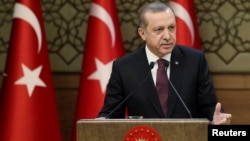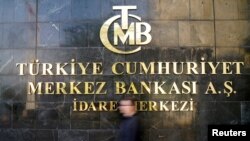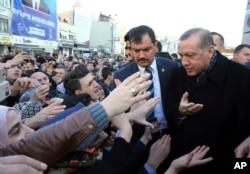Turkey's President Recep Tayyip Erdogan claims the sharp decline of the Turkish lira is the latest plot to unseat him from power. A failed coup took place in July, and Erdogan is warning that what conspirators could not achieve with tanks, they are now trying by financial means.
On Sunday in the Turkish City of Kayseri as Erdogan spoke to flag waving supporters, he called on patriots to act: "Those who keep dollar or euro currency under their mattresses should come and turn them into liras or gold," bellowed the Turkish President.
Turkish media has been full of reports of small businessmen heeding their president's call, offering free fish, hair cuts and even grave stones to any person who could prove they sold foreign currency to buy the lira.
Pro government newspaper columnists have attacked people who bought dollars and euros, accusing them of conspiring against the president.
Strategy questioned
But the effectiveness of Erdogan's lira strategy, is increasingly being questioned, "While the patriotic Turks may heed him and will probably exchange their currency holdings," suggests political consultant Atilla Yesilada of Global Source Partners, "you got to remember that 48 percent of these people don't vote for him, and they are scared, and many of whom may choose to take their money abroad. Assuming only 10 percent of domestic savers choose to send their money abroad, that would be $9 billion and that would be huge."
With few financial controls in Turkey on movement of capital and a sophisticated banking system, analysts say it is easy to move large amounts of capital abroad.
In the past month the lira fell 11 percent, making it this year's worst performing emerging market currency. If the President's tough rhetoric fails to stem further falls, rumors and speculation are growing that capital controls could be introduced on foreign currency accounts.
Meeting set for Thursday
Despite strong government denials, concerns appear to have spread overseas. "I have been receiving questions from investors about potential capital controls," claims emerging market economist Inan Demir of Nomura Bank, "but that would be the nuclear option for the government. I think government is rational enough to recognize the problem Turkey faces is not only about limiting outflows from the country, but also that Turkey has a large need of external financing. If capital controls were announced, it would severely effect further capital inflows."
But analysts suggest the government's hand could be forced. "That's where danger lies; action brings reaction," warns consultant Yesilada. "If the government in consultation with banks and the central bank, realizes those skeptical of the government are taking their money outside the country on a large scale, then you will have capital controls, like china. You will have limits on what money you can take out and that will really scare foreign institutional investors, who have 80 billion dollars invested in Turkish financial markets, so you might see a chain reaction of them scrambling for the door."
All eyes are on a government meeting scheduled for Thursday which is scheduled to discuss the sliding currency. Pressure is growing for action. "The central bank needs to step in to break a vicious circle where expectations of further Turkish lira weakness fuels the very lira weakness that people fear," claims economist Demir, "and to short circuit that vicious cycle, the central bank would need to use the interest rate tool because the reserve position is not strong. But of course the political constraints of using the interest rate tool are also very significant."
"Dollar" loans a concern
Last month, the central bank did moderately increase rates. But a sharp increase in interest rates is widely seen as unlikely. That's because it could jeopardize Erdogan's bid to increase his presidential powers, which he reportedly plans to put to a referendum before the middle of next year. "With a referendum coming up and the said measures (interest rate increases) could potentially leading to a recession," predicts analyst Yesilada, "you never know if you have an economic shake down in Turkey people might decide to punish Erdogan for mismanagement of the economy."
But failure to hike interest rates and to try and face down the financial markets carries risks too. Turkish companies are estimated to owe around $200 billion in loans denominated in dollars. Analysts warn that further slides of the lira will make servicing those debts increasingly more difficult, impacting the wider Turkish economy.
But Erdogan appears to be doubling down, calling for a reduction in interest rates to boost the economy and warning the country is fighting a war for Turkey's independence.






